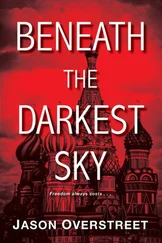Ahmed brought in the bottle and the glasses. They drank for a moment in silence; then the lieutenant remarked, as much to break the silence as for any other reason: “Ah, yes. Life is amazing. Nothing ever happens the way one imagines it is going to. One realizes that most clearly here; all your philosophic systems crumble. At every turn one finds the unexpected. When your friend came here without his passport and accused poor Abdelkader, who ever would have thought that this short time later such a thing would have happened to him?” Then, thinking that his sequence of logic might be misinterpreted, he added: “Abdelkader was very sorry to hear of his death. He bore him no grudge, you know.”
Tunner seemed not to be listening. The lieutenant’s mind ambled off in another direction. “Tell me,” he said, curiosity coloring his voice, “did you ever manage to convince Captain Broussard that his suspicions about the lady were unfounded? Or does he still think they were not married? In his letter to me he said some very unkind things about her. You showed him Monsieur Moresby’s passport?”
“What?” said Tunner, knowing he was going to have trouble with his French. “Oh, yes. I gave it to him to send to the Consul in Algiers with his report. But he never believed they were married, because Mrs. Moresby promised to give him her passport, and in place of that, ran away. So he had no idea who she really was.”
“But they were husband and wife,” pursued the lieutenant softly.
“Of course. Of course,” said Tunner with impatience, feeling that for him even to engage in such a conversation was disloyal.
“And even if they had not been, what difference?” He poured them each another drink, and seeing that his guest was disinclined to continue that conversation, he went on to another which might be less painful in its associations. Tunner, however, followed the new one with almost as little enthusiasm. At the back of his mind he kept reliving the day of the burial in Sba. Port’s death had been the only truly unacceptable fact in his life. Even now he knew that he had lost a great deal, that Port really had been his closest friend (how had he failed to recognize that before?), but he felt that it would be only later, when he had come to the full acceptance of the fact of his death, that he would be able to begin reckoning his loss in detail.
Tunner was sentimental, and in accordance with this trait, his conscience troubled him for not having offered more vigorous opposition to Captain Broussard’s insistence upon a certain amount of religious ceremony during the burial. He had the feeling that he had been cowardly about it; he was certain that Port would have despised the inclusion of such nonsense on that occasion and would have relied upon his friend to see that it was not carried through. To be sure, he had protested beforehand that Port was not a Catholic—was not even, strictly speaking, a Christian, and consequently had the right to be spared such goings-on at his own funeral. But Captain Broussard had replied with heat: “I have only your word for all this, monsieur. And you were not with him when he died. You have no idea what his last thoughts were, what his final wishes may have been. Even if you were willing to take upon yourself such an enormous responsibility as to pretend to know such a thing, I could not let you do it. I am a Catholic, monsieur, and I am also in command here.” And Tunner had given in. So that instead of being buried anonymously and in silence out on the hammada or in the ereg, where surely he would have wished to be put, Port had been laid to rest officially in the tiny Christian cemetery behind the fort, while phrases in Latin were spoken. To Tunner’s sentimental mind it had seemed grossly unfair, but he had seen no way of preventing it. Now he felt that he had been weak and somehow unfaithful. At night when he lay awake thinking about it, it had even occurred to him that he might go all the way back to Sba and, waiting for the right moment, break into the cemetery and destroy the absurd little cross they had put over the grave. It was the sort of gesture which would have made him happier, but he knew he never would make it.
Instead, he told himself, he would be practical, and the important thing now was to find Kit and get her back to New York. In the beginning he had felt that in some way the whole business of her vanishing was a nightmarish practical joke, that at the end of a week or so she would surely have reappeared, just as she had on the train ride to Boussif. And so he had determined to wait until she did. Now that time had elapsed and there was still no sign of her, he understood that he would wait much longer—indefinitely if necessary.
He put his glass on the coffee table beside him. Giving voice to his thoughts, he said: “I’m going to stay here until Mrs. Moresby is found.” And he asked himself why he was being so stubborn about it, why Kit’s return obsessed him so utterly. Assuredly he was not in love with the poor girl. His overtures to her had been made out of pity (because she was a woman) and out of vanity (because he was a man), and the two feelings together had awakened the acquisitive desire of the trophy collector, nothing more. In fact, at this point, he realized that unless he thought carefully he was inclined to pass over the entire episode of intimacy between them, and to consider Kit purely in terms of their first meeting, when she and Port had impressed him so deeply as being the two people in the world he had wanted to know. It was less of a strain on his conscience that way; for more than once he had asked himself what had happened that crazy day at Sba when she had refused to open the door of the sick chamber, and whether or not she had told Port of her infidelity. Fervently he hoped not; he did not want to think of it.
“Yes,” said Lieutenant d’Armagnac. “You can’t very well go back to New York and have all your friends ask: ‘What have you done with Mrs. Moresby?’ That would be very embarrassing.”
Inwardly Tunner winced. He definitely could not. Those who knew the two families might already be asking it of each other (since he had sent Port’s mother both items of unfortunate news in two cables separated in time by three days, in the hope that Kit would turn up), but they were there and he was here, and he did not have to face them when they said: “So both Port and Kit are gone!” It was the sort of thing that never did, couldn’t, happen, and if he remained here in Bou Noura long enough he knew she would be unearthed.
“Very embarrassing,” he agreed, laughing uncomfortably. Even Port’s death by itself would be difficult enough to account for. There would be those who would say: “For God’s sake, couldn’t you have gotten him into a plane and up to a hospital somewhere, at least as far as Algiers? Typhoid’s not that quick, you know.” And he would have to admit that he had left them and gone off by himself, that he hadn’t been able to “take” the desert. Still, he could envisage all that without too much misery; Port had neglected to be immunized against any sort of disease before leaving. But to go back leaving Kit lost was unthinkable from every point of view.
“Of course,” ventured the lieutenant, again remembering the possible complications should the lost American lady turn up in anything but perfect condition, and then be moved to Bou Noura because of Tunner’s presence there, “your staying or not staying will have nothing to do with her being found.” He felt ashamed as soon as he heard the words come out of his mouth, but it was too late; they had been spoken.
“I know, I know,” said Tunner vehemently. “But I’m going to stay.” There was no more to be said about it; Lieutenant d’Armagnac would not raise the question again.
Читать дальше











